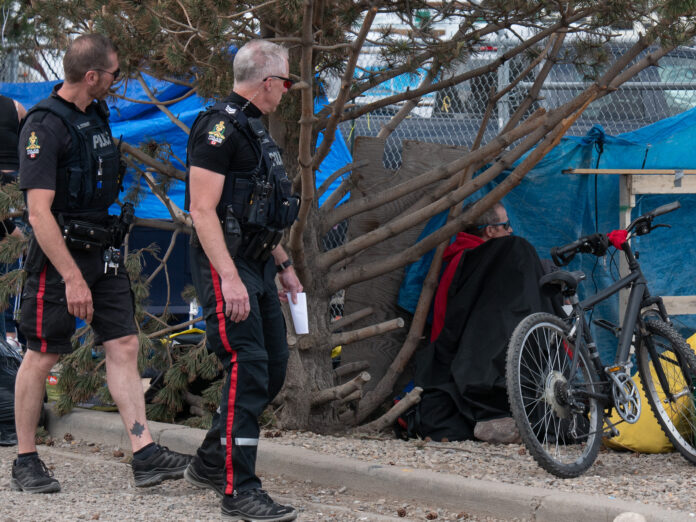The biggest challenge in finding a more dignified approach to the issue of homelessness and providing better treatment to individuals in Lethbridge is funding, according to Mayor Blaine Hyggen. Downtown BRZ Clean Sweep Team and members of the Lethbridge Police Service tore down an encampment near the Lethbridge Stabilization Centre and Shelter on June 1. People congregated there again after a couple similar operations in early May.
READ MORE: Encampment teardown continues outside Lethbridge shelter
“We are advocating continually to the federal government and the provincial government for additional housing. That would help alleviate some of the concerns that we currently are having within our community,” Hyggen said. “You don’t have a place to go, you don’t have a house — where are you gonna go? We are going to shuffle people around, you are still going to have to find a place that you are going to be, you are going to have to stay for the night.”
Hyggen said there are many things that need to be done to help people experiencing homelessness and the city could allocate funds, if it is something taxpayers would like to see.
“It’s extremely important to know that even though it’s not in our lane if you say — it’s not our mandate, housing, it’s important that we still really focus on the importance of having housing so again, advocating, allocating funds in needs be to that,” he said.
RELATED: ‘We can do better’: some residents question handling of homeless encampments
Shaundra Bruvall, communications manager at Alpha House, the organization that runs the shelter, said she would like community members to know the benefits of supportive housing. These include a reduction in homelessness, reduced social issues and reduction in substance use in public places.
“It’s really those pieces with community members that I think is one of the biggest advocacy pieces lacking — is that attitude of ‘not in my backyard,’ it’s really about having those conversations to change that narrative,” she said.
Jolene Across The Mountain was camping outside the shelter on June 1 when the city and police were clearing people out. She said she and others have no place to go and were not ready to leave.
“I just wish there was more information, more understanding on the other side that just being judged and mistreated from the morning till night time. Every store I go into I am followed. We are not all the same,” she said. “I didn’t choose to wake up and be homeless one day and have addictions but losing your mom, your brother, your dad, your uncles, your two aunts, your two brothers — all my family, leaving just me and my kids in one year, coming out of a coma and not having their support and having to be homeless for the first time.”
Bruvall noted supportive housing could help reduce public spending on things such as healthcare, criminal justice and law enforcement and that the saved money could be put back into stable housing.
Hyggen said he has asked about allowing people to camp in the yard outside the shelter. “There is a large space — if there was security there, could we not have that as an area? These are other options that have been put forward. I am not an expert in these so I bring these suggestions forward to administration and let them work through the details.”
Alpha House does not have the resources to monitor people camping outside, Bruvall said and pointed to housing programs as the solution. Hyggen said he has seen other communities set up safe places for people to set up tents and the city is looking into options for shorter-term solutions to support people as it continues working on advocacy with other levels of government.
“Nobody wants to see somebody’s home removed and a home could be somebody’s tent and nobody wants to see that, but unfortunately throughout the world and especially here in North America, there’s a lot of deaths that happen inside these [encampments],” Hyggen said. “Overdoses where security can’t see what is going on — there’s also fires that have happened in the past, lives have been lost because tents will start on fire. They’ll try to get warm so you know what, removing these, again nobody wants to have their home removed, but there is a safety aspect that we really need to monitor as well.”
Editors note: The original version of this story stated the encampment was cleared by members of City of Lethbridge staff. It has been updated to clarify that it was cleared by members of the Downtown BRZ Clean Sweep Team. We apologize for any confusion this may have caused.






